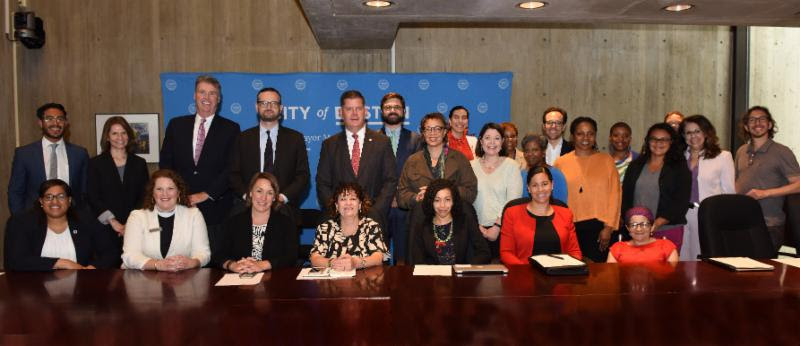Boston's Complete Count Committee announced ahead of 2020 census
Full participation in the 2020 U.S. Census will rely on outreach in hard-to-count communities.
Mayor Martin J. Walsh today announced the City of Boston's Complete Count Committee, a group of cross-sector leaders that will work to ensure that all Boston residents are aware of the upcoming 2020 U.S. Census, know why it's important, and are prepared to participate. Census day is April 1, 2020, starting the decennial count that determines everything from representation in Congress, to federal funds for schools, affordable housing, infrastructure and health care programs.
"We want to ensure all Bostonians are counted, because all Bostonians count," said Mayor Walsh. "Members of our Complete Count Committee have the expertise and knowledge in their fields, and are trusted voices in the community. Their leadership will play a vital role in our outreach efforts, and we're confident that they will help us organize and mobilize Bostonians to ensure an equitable and accurate count."
The following is a list of Boston's Complete Count Committee:
- Colleen Flanagan, Executive Director & Co-founder, Disability Action for America
- Emily K. Shea, Commissioner, Age Strong Commission
- Marinell Rousmaniere, President & CEO, EdVestors
- Jacquelynne J. Bowman, Executive Director, Greater Boston Legal Services
- John J. Drew, President & CEO, Action for Boston Community Development
- Beth Chandler, President & CEO, YW Boston
- James O'S. Morton, President & CEO, YMCA of Greater Boston
- James E. Rooney, President & CEO, Greater Boston Chamber of Commerce
- Makeeba McCreary, Chief of Learning & Community Engagement, Museum of Fine Arts, Boston
- Rev. Laura E. Everett, Executive Director, Massachusetts Council of Churches
- Rev. David Wright, Executive Director, Black Ministerial Alliance of Greater Boston
- Rep. Chynah Tyler, Massachusetts House of Representatives, 7th Suffolk
- City Council President Andrea J. Campbell, District 4
- Kate Audette, Director of State Government Relations, Boston Children's Hospital
- Dr. Valerie Roberson, President, Roxbury Community College
- Richard J. Doherty, President, The Association of Independent Colleges and Universities in Massachusetts
- Vanessa Calderón-Rosado, CEO, Inquilinos Boricuas en Acción
- Lyndia Downie, President & Executive Director, Pine Street Inn
- Carlos Aramayo, Financial Secretary Treasurer, UNITE HERE, Local 26
- Darlene Lombos, Executive Director, Community Labor United
- Gustavo Quiroga, Director of Neighborhood Strategy & Development, Graffito SP
- Jocelyn V. Sargent, Executive Director, The Hyams Foundation
Mayor Walsh and Boston's Complete Count Committee met this week to go over the City's outreach strategy and receive assignments to one of the following subcommittees: aging and persons with disabilities, children and youth, community-based organizations, community centers, corporate and business associations, cultural institutions, faith-based organizations, government officials, health care, higher education, housing and homelessness, labor, Main Streets and neighborhood businesses, and philanthropic foundations.
"I am honored to serve on Boston's Complete Count Committee and to join a diverse group of leaders charged with ensuring our hardest to reach populations, including our immigrants and people of color, are counted," said Boston City Council President Andrea J. Campbell. "I look forward to exploring all available tools so that our City and all Bostonians ultimately receive the resources they are due."
"I am honored to sit on of the City of Boston's Complete Count Committee. The census represents an opportunity for our communities to work towards closing inequitable disparities," said Rep. Chynah Tyler. "With an accurate census count, we can ensure that the federal, state, and local governments provide the adequate amount of assistance to address all issue areas facing Bostonians, especially our most vulnerable."
"Religious communities know the worth of every person. We're excited to work with the City to ensure a complete count of every Bostonian," said Rev. Laura E. Everett, Executive Director, Massachusetts Council of Churches.
In April 2019, Mayor Walsh, nonprofit leaders and community members launched a year-long outreach campaign to ensure a fair and complete count in the 2020 U.S. Census, where he announced the City is investing an additional $100,000 in his FY20 budget to support Boston's outreach efforts by providing grants to community-based organizations and more support to City departments. This is in addition to a FY19 investment of dedicated staffing resources to support the City's census efforts announced in the Mayor's 2019 State of the City address.
Next year's Census faces unprecedented challenges, including significant underfunding of the U.S. Census Bureau, the nearly all-digital nature of the surveys, and the possible inclusion of a citizenship question on which the Supreme Court will soon issue a ruling on. Boston Counts 2020 is the City's effort to support an equitable and complete count in the next U.S. Census, and the Committee will work to ensure every resident in Boston is counted.
Data from the 2010 Census determine around $16 billion every year in federal spending for critical programs such as Medicaid, Medicare, affordable housing initiatives, Title I education funding, and infrastructure in Massachusetts. For every one person that's not counted on the Census, the state loses out on roughly $2,400 of federal funding.
Despite the amount of federal resources at stake, there are multiple hard-to-count populations that reside in Massachusetts that historically have made a complete census count difficult. This is due in part to the state's population of recent immigrants, renters, college students, and other hard-to-count populations. Boston is the ninth hardest-to-count city among the largest 100 cities nationwide, according to a recent report by Boston Indicators and the Boston Foundation.
For more information on the City's outreach efforts to ensure a fair and complete count, please visit boston.gov/2020-census.


